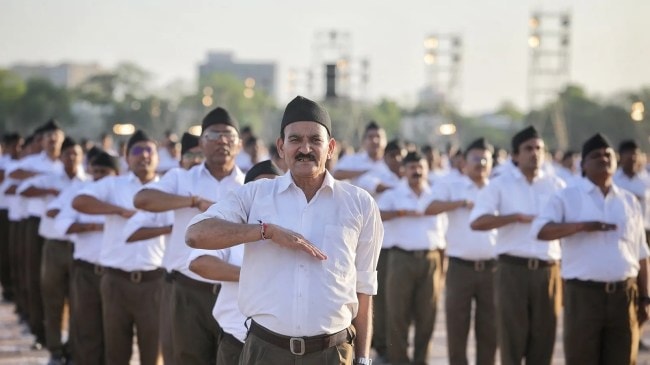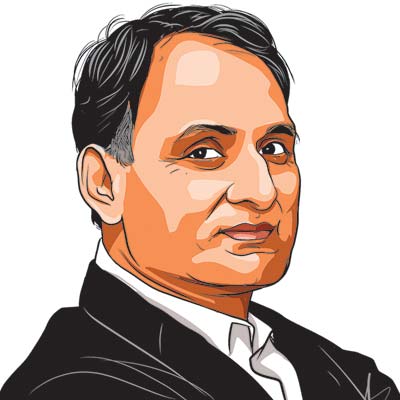Opinion India’s intellectual elite has never made any effort to understand the RSS’s appeal. The loss is theirs
Indian politico-intellectual life exposes its disregard for a diversity of ideas and our own ancient heritage of debates. It also shows how far we lag behind the Western intellectual tradition of a critical exchange for greater understanding.
 The intellectual dichotomy of Indian politico-intellectual life exposes its disregard for the diversity of ideas and our own ancient heritage of debates.
The intellectual dichotomy of Indian politico-intellectual life exposes its disregard for the diversity of ideas and our own ancient heritage of debates. Congress President Mallikarjun Kharge is not the first to publicly express his abhorrence for the RSS and demand a ban on it. The organisation faced coercive political and legal actions at multiple times during the colonial period and in independent India. Nevertheless, its growth was unchecked. Hegemony breeds delusion and comfort. This happened with the political and intellectual classes in independent India, who considered it unworthy to engage with the RSS and at the same time made it a reference point to prove their credentials as secular democrats. This continues even in their decline.
The RSS, on the other hand, created a counter-narrative by cultivating and consolidating a support base through grassroots activism. Its actions have been intended to create ideological literacy among Hindus about their history, legacies and dreams for the future. The natural corollary to this is that conflicts between the Sangh and left-liberals produced a wasteful incompatibility on vital issues like nationalism, secularism and culture.
The intellectual dichotomy of Indian politico-intellectual life exposes its disregard for the diversity of ideas and our own ancient heritage of debates. It also shows how far we lag behind the Western intellectual tradition of a critical exchange of ideas for greater understanding. This was not the case in the pre-Independence era when critical thinking was a hallmark. Unfortunately, this came to an end after the rich debates of the Constituent Assembly, to which all sides of the Indian political spectrum refer without internalising their spirit.
The magnanimity of social and political leaders in the pre-Independence period fostered reform movements. Even the extremes existed without fear and with legitimate voices. The leaders of the time did not have inhibitions about knowing and interacting with different ideas and their representatives, which is why Mahatma Gandhi and B R Ambedkar visited RSS camps and held dialogues with its founder, K B Hedgewar. Moreover, personal accounts of other leaders of the national movement, including Jamnalal Bajaj, Vinoba Bhave, Subhas Chandra Bose, K M Munshi, Madan Mohan Malaviya, M S Aney, M R Jayakar, N B Khare, N R Malkani, Pattabhi Sitaramayya, Shankarrao Deo and Sampurnananda reveal their desire to understand the RSS. Many shared the Sangh’s perspective on secularism. Regional newspapers devoted considerable space to critical discussion of the RSS’s ideology.
In contrast, Congress has never made a sincere effort to understand what has enabled the RSS to grow by leaps and bounds. The left-liberals slipped into a siege mentality, and anti-RSS-ism became a veil to hide their decline. This was seen when the Karnataka government wanted to ban the Sangh from holding its activities in public places and prohibit government employees from participating in it. There is a historical parallel. The British administration in the Central Provinces and Berar issued two circulars, in 1932 and 1933, prohibiting government as well as local self-government employees from participating in RSS activities.
During the 1934 budget session of the CP and Berar Legislative Council, V D Kolte moved a one-rupee cut motion opposing the circular. The two-day debate covered almost all the allegations still repeated by Congress and left-liberals today. All 14 members who participated in the debate, including M S Rahman, criticised the circular. Eventually, it was withdrawn. The critics would benefit by reading the debate. Only the productive problematisation of historical facts can solve incompatibility of ideas.
A nuanced debate on the RSS is conspicuously missing. Opponents and proponents do not go beyond quotes from Bunch of Thoughts, a collection of speeches of the second RSS chief, M S Golwalkar, and Hindutva by V D Savarkar. Neither of these constitutes the RSS’s Bible. RSS chief Mohan Bhagwat’s frequent meetings with religious leaders and intellectuals are an attempt to bring back the stopped clock of ideas to life. However, this has not received an adequate response, Kharge’s statement being the latest example.
In essence, debates surrounding the RSS have largely been archival and guided by electoral prudence. The Nehruvian era and communist rule in different parts of the world demonstrated that ideas do not progress on the shoulders of either career intellectuals or rebranded institutions; rather, this leads to the Icarus paradox.
The writer is a former BJP Rajya Sabha MP





